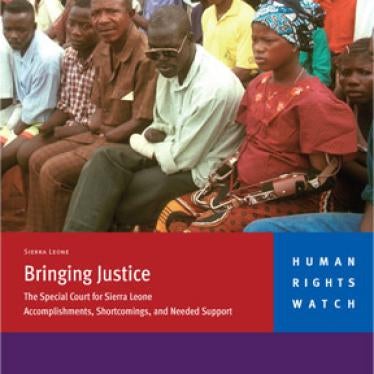(New York) - The United Nations Security Council should work toward the prompt surrender of former Liberian President Charles Taylor to Sierra Leone’s U.N.-backed war crimes court, Human Rights Watch said today.
This morning the Security Council will be briefed on the progress of the Special Court for Sierra Leone by the tribunal’s president, Justice Emmanuel Ayoola. Since 2002, the court has been working to bring to justice those who “bear the greatest responsibility” for war crimes committed during Sierra Leone’s brutal civil war.
The Special Court has indicted Taylor on 17 counts of war crimes and crimes against humanity. The Security Council should affirm the urgency of Taylor being held accountable and commit itself to explore with Nigeria, which granted Taylor conditional asylum, a strategy to surrender him to the court as soon as possible.
“Charles Taylor should face trial for his alleged role in the death, rape, abduction, and mutilation of thousands of civilians during Sierra Leone’s civil war,” said Richard Dicker, director of the International Justice Program at Human Rights Watch. “His continued safe haven undermines justice for the victims whose lives were torn apart during this brutal war.”
“The U.N. Security Council must act to ensure Taylor’s prompt surrender to face trial at the Special Court,” Dicker emphasized.
Taylor, indicted by the court two years ago, has been in exile in Nigeria since he was forced from power in August 2003. In addition to Taylor’s surrender, ensuring that the court has adequate security and funding are key for the court to complete operations.
Taylor is in exile in Nigeria as a result of an arrangement tacitly agreed to by the United States and the United Kingdom, among others. Nigerian President Olusegun Obasanjo has said that Taylor was given asylum to avoid excessive civilian casualties in Liberia when government troops under Taylor battled rebels for control of the Liberian capital Monrovia in July and August 2003. The arrangement reportedly includes a condition that Taylor refrain from interfering in Liberia’s political affairs.
Taylor’s continued evasion of justice not only mocks the victims of war crimes and crimes against humanity in Sierra Leone, but also poses a risk to stability in West Africa, Human Rights Watch said. There are persistent reports that Taylor is involved in destabilizing the government of Guinea and meddling in the internal political affairs of Liberia, which is due to hold general elections in October.
“Once again, Taylor’s actions could be putting innocent lives at risk in West Africa,” said Dicker. “Whatever deal was made two years ago to give Taylor asylum in Nigeria, he has more than broken the terms.”
Officials from the Prosecutor’s Office of the Special Court said they have received information that Taylor was involved in a January 2005 assassination attempt on Guinean President Lansana Conté. There are also allegations that he may be supporting an insurgency against the Guinean government composed of fighters loyal to Taylor. During the Liberian civil war of 1999-2003, Guinea provided logistical assistance to rebels which in July 2003 overran Monrovia. There are other allegations that Taylor remains in frequent contact with members of his former government. According to Special Court officials, Taylor traveled from Nigeria to Burkina Faso in February to meet with Liberian presidential hopeful Francis Galawolo.
“Taylor is a poster child for the link between justice and security in West Africa,” said Dicker. “The Security Council’s handling of the Taylor issue will be a clear test of its commitment to both.”
The Special Court for Sierra Leone began operating in Freetown in July 2002 and is expected to function only on a short timeframe. Human Rights Watch researchers who were recently in Freetown found that the Special Court continues to make major achievements to bring accountability for atrocities committed during Sierra Leone’s civil war, which lasted from 1991 to 2002.
Three trials of nine indictees are being held simultaneously. Numerous witnesses from around the country are testifying, receiving needed protection and support. A defense office is helping to protect the rights of the accused, monitoring the situation of detainees and advocating for resources to ensure a vigorous defense. Outreach continues to effectively canvass the country with information about the court through video, radio, and public discussions.
Nevertheless, the court, which was initially supported entirely by voluntary contributions, has faced significant difficulties in raising adequate funds to operate. A grant from the United Nations has made continued functioning possible. Additionally, while security for the court has to date been provided by the U.N. Mission in Sierra Leone (UNAMSIL), this force is expected to withdraw from Sierra Leone by the end of 2005.
“The Special Court has made tremendous accomplishments in the face of serious obstacles,” said Dicker. “It must have adequate funding and security to finish its work.”
Background on Charles Taylor and the Special Court
Elected president of Liberia in 1997 after a seven-year war that ousted former President Samuel Doe, Charles Taylor gained notoriety for the brutal abuses against civilians committed by his forces in Liberia, and for his use of child soldiers organized in “Small Boy Units.” Forces supported by Taylor have since been involved in conflicts in neighboring Guinea and Côte d’Ivoire.
The Special Court has the power to prosecute serious violations of international law and certain violations of domestic law committed in Sierra Leone since November 30, 1996. The United Nations created the Special Court through an agreement with the government of Sierra Leone.






